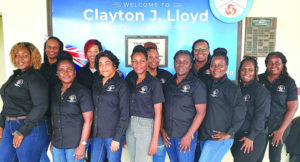
A team of thirteen Anguillian educators left the island on Monday, January 8th to attend the South East Early Literacy Conference in Myrtle Beach, South Carolina.
The delegation includes eight Reading Teachers including Ms. Dawvier Gumbs, Ms. Mavis Rogers, Ms. Renee Bryan, Mrs. Carol Richardson, Ms. Trevolyn Richards, Ms. Natasha Allwaters, Mrs. Kenda Lake and Mrs. Verin Fleming. Also among the group is one Reading Recovery Teacher, Ms. Catherine Proctor, as well as a Special Education Needs Teacher, Mrs. Jacqueline Fleming-Hodge. There is also one Deputy Principal / Special Education Needs Coordinator, Ms. Avecia Webster, and a Deputy Principal / Reading Recovery Teacher, Ms. Itasha Webster. They are accompanied by Education Officer in Support Services, Mrs. Tracelyn Hamilton.
Mrs. Hamilton spoke with The Anguillian prior to their departure and said: “This is not the first time we are attending the Conference. Nine teachers attended last year’s conference in Myrtle Beach and that group of seven Reading Recovery Teachers and two Remedial Reading Teachers benefited much from the conference.”
“There is a difference between reading recovery and remedial reading,” she pointed out. “Reading Recovery Teachers focus on assisting students on a one-on-one basis for a minimum of a half-hour each session for up to a maximum of twenty weeks. On the other hand, Remedial Reading Teachers support small groups of students in developing their reading skills. Remedial Reading Teachers work with students from Grade 2 to Grade 6. However, Reading Recovery Teachers work with students in Grade 1 only.”
When asked if students who are deficient in Math skills would be able to benefit from a similar conference or programs comparable to Reading Recovery or Remedial Reading, Mrs. Hamilton explained: “Student Support Services cater to a range of support-oriented programs that would benefit the students who need such support. For example, we do not only provide support in the areas of remedial reading and reading recovery, but we also facilitate school nursing, education welfare attention, school psychologist attention, drug counseling, and English as a Second Language (ESL) support, etc.”
“The subject of Math, though, would fall under the mandate of Curriculum,” she said. “Officers in that sector of the Education Department have also started with their initiatives to aid those students deficient in the areas of Math. So, yes, the division of Curriculum will address the area of support in such subjects as Math and Science.”
She said while the Curriculum Division focuses on the teaching of the various subjects, her division – Student Support Services, focuses primarily on supporting the students who are in need of special assistance.
Mrs. Hamilton noted that her support division which was formerly called “Multi-Professional Support Services” was recently renamed “Student Support Services”.
Asked how the educators plan to implement the strategies gleaned from the Myrtle Beach conference, Mrs. Hamilton said that plans are in place for the conference participants to impart, upon their return, what they would have learnt from the literacy conference:
“Upon our return, we plan to split into groups and visit all of the primary schools during their Professional Development sessions,” she said. “At that time, we would disseminate support from the skills that we would garner at the conference. Already, we have pre-determined what specific areas of the conference would be of particular interest to each individual educator in the group. So, during the conference, each of us will be attending individual sessions so that we can derive relevant skills from the overall conference.”
The Anguilla delegation will join a diverse group of education professionals and researchers from around the world to share insights, strategies and innovations in the field of literacy education. They will explore the latest advancements in literacy instruction and exchange ideas to enhance their teaching practices.








